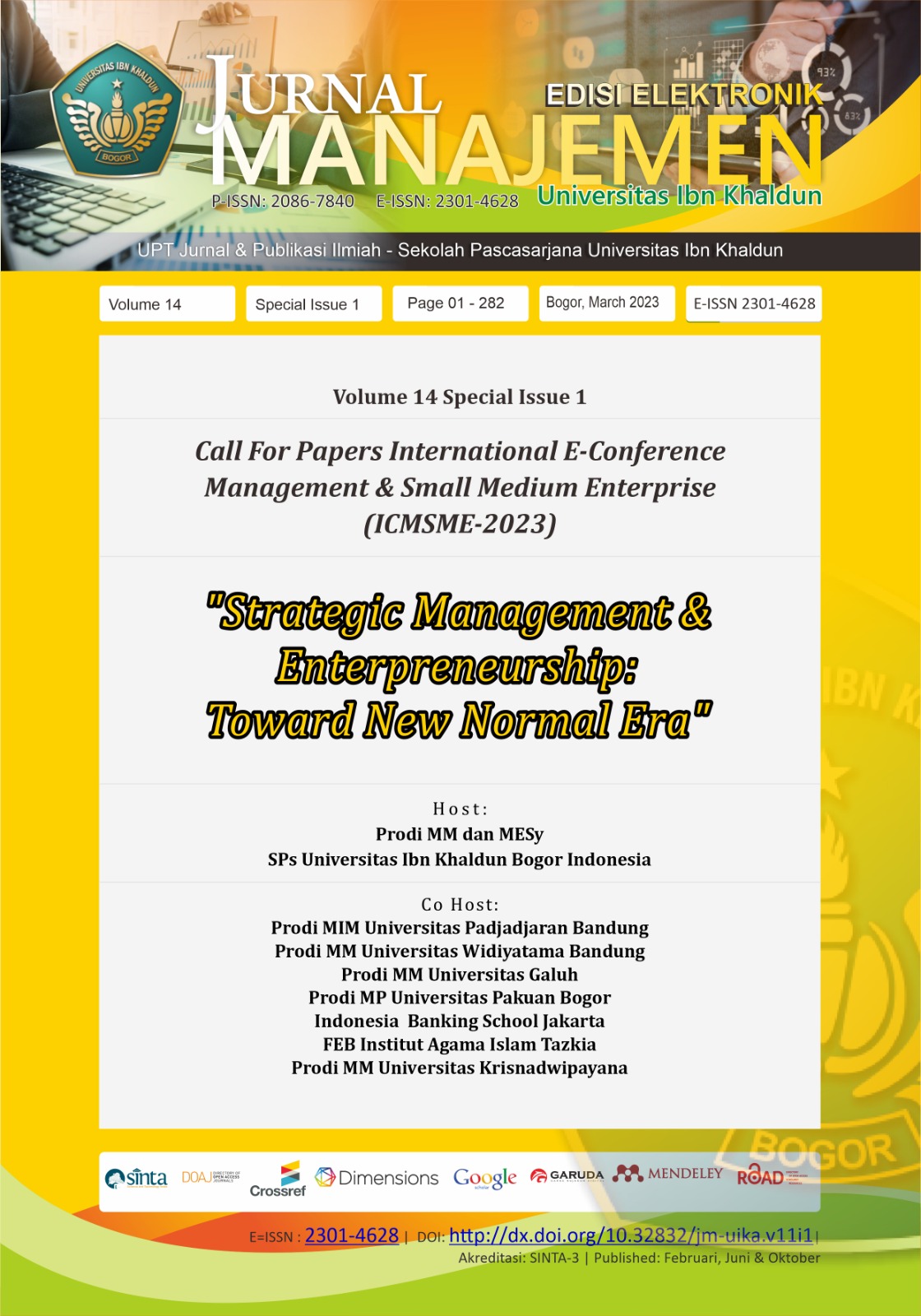Development of Flip PDF Corporate Edition Based Learning Media on Price Index Material at SMA Negeri 3 Banjarbaru
DOI:
https://doi.org/10.32832/jm-uika.v14i1.9782Keywords:
learning media, flip PDF corporate edition, ADDIEAbstract
Learning media is one of the important supports that can be used in learning activities. In this study the was to develop flip PDF corporate edition-based learning media on price index material. The discussion is carried out measure the feasibility of learning media and influence of learning media on learning outcomes perice index material. This research is included in research and development with the ADDIE development model. Media feasibility assessment is validated by media experts, material experts, and practitioners. Measurement of learning outcomes using the Pretest-Posttest Control Group Design. Learning media result validated by media experts obtained an average score of 4.43 very good criteria and an assessment of the percentage of 88.61% in the very decent category. The results material expert validation obtained an average rating of 4.29 very good criteria and a percentage of 85.84% very feasible category. In limited field trials the average rating was 4.35 very good criteria and 86.88% very feasible category. While the operational field trials obtained an average score of 4.33 very good criteria and a percentage of 86.43% very feasible category. Overall obtaining an average score of 4.35 very good criteria and a percentage of 86.94% very feasible category. Testing the influence of the media learning outcomes using the Wilcoxon test, the results of the experimental and control groups obtained the same significance value, namely <0.001 < 0.05. Meanwhile, the Mann Whitney test yielded a significance value of 0.032 < 0.05.
References
Citra, CA, & Rosy, B. (2020). The Effectiveness of Using Quizizz Educational Game-Based Learning Media on Learning Outcomes of Office Technology Class X Students of SMK Ketintang Surabaya. Journal of Office Administration Education (JPAP), 8, 261–272. https://doi.org/10.26740/jpap.v8n2.p261-272
Deviyanti, Ekawarna, & Yantoro. (2020). Development of Google Classroom-Based E-Learning Media to Improve Student Learning Outcomes in Class XI Economics at SMA Unggul Sakti Jambi. Journal of Educational Management and Social Sciences, 1(1), 303–316. https://doi.org/10.38035/JMPIS
Fardany, MM, & Dewi, RM (2020). Development of Powtoon Learning Media Based on a Scientific Approach in Economics Subjects. Journal of Economic Education (JUPE), 08(3), 101–108. https://doi.org/10.26740/jupe.v8n3.p101-108
Gemmara, SA, & Subroto, WT (2019). Development of Learning Media Mysterious Boxes and Cards to Improve Student Learning Outcomes in Class X High School Economics. Journal of Economic Education, 12(2), 104–110. http://journal2.um.ac.id/index.php/jpe/article/view/8819
Ghalib, IA, & Ali, M. (2022). The Influence of Contextual Teaching and Learning (CTL) Based Geogebra Learning Media on Spatial Ability in Flat Sided Space Building Materials. Journal of Mathematical Pedagogy, 8, 1–10. https://journal.student.uny.ac.id/index.php/jpm/article/view/18552
Gunawan, IGD (2017). Utilization of Social Media as a Media for Hindu Religious Education. Journal of Bawi Ayah, 8(2), 16–27. https://doi.org/10.33363/ba.v8i2.293
Hanisah, Irhasyuarna, Y., & Yulinda, R. (2022). Development of Interactive Learning Media using Ispring suite 10 on Plant Reproduction Materials for Measuring Learning Outcomes. JUPEIS: Journal of Education and Social Sciences, 1(3), 6–16. https://doi.org/10.55784/jupeis.Vol1.Iss3.68
Muthoharoh, FC (2021). Development of Narrative Video-Based Learning Media with Metacognitive on Employment Materials. EDUCATIVE : Journal of Education, 3(5), 2032–2039. https://doi.org/10.31004/edukatif.v3i5.713
Nurhasanah, E. (2021). Development of Macromedia Flash-Based Learning Multimedia on the History of Islamic Development to Improve Student Learning Outcomes. Journal of Research and Community Service in the Field of Education, 2, 148–153. https://doi.org/10.54371/ainj.v2i3.69
Nurparida, & Srirahayu, E. (2021). The Effectiveness of Audio Visual Media in Improving Student Learning Outcomes in Integrated IPS Learning Class VII MTS. Al Yusufiyah. Journal of Social Sciences and Education, 5(1), 155–162. http://dx.doi.org/10.58258/jisip.v5i1.1628
Nurrita, T. (2018). Development of Learning Media to Improve Student Learning Outcomes. Misykat, 03, 171–187. https://lmsspada.kemdikbud.go.id/pluginfile.php/423559/mod_resource/content/2/Mahan reading.pdf
Rahima, M, AS, & Haryandi, S. (2021). The development of digital teaching materials trains problem solving skills in physics. National Seminar on Physics Education, September, 10–20. http://snpfmotogpe.ulm.ac.id/wp-content/uploads/2022/01/2-RAHIMAH-10-20.pdf
Rahmattullah, Inanna, & Ampa, AT (2020). Canva Application Based Audio Visual Learning Media. Undiksha Journal of Economic Education, 12(2), 317–327. https://doi.org/10.23887/jjpe.v12i2.30179
Saputra, PW, & Gunawan, IGD (2021). Utilization of Digital Learning Media in Efforts to Increase Learning Effectiveness in the Covid-19 Period. Proceedings of the National Webinar IAHN-TP Palangka Raya, 3, 86–95. https://doi.org/10.33363/sn.v0i3.94
Sugiyono. (2018). Quantitative Qualitative Research Methods and R&D. Bandung Alphabet Publisher.
Wahyono, HN (2019). Development of Android-Based Interactive Economic Learning Media as an Effort to Increase Student Activity and Learning Outcomes. 2–5. https://doi.org/10.25273/gulawentah.v4i2.5522
Yanti, NS, & Huda, Y. (2020). Analysis of the Feasibility Level of the "Appypie" Android Application as a Learning Media. Journal of Vocational Electronics and Informatics Engineering, 8(4), 115–120. https://doi.org/10.24036/voteteknika.v8i4.110256
Zinnurain. (2021). Development of Flip PDF Corporate Edition Based Interactive Learning E-Modules in Education and Training Management Courses. Academia: Journal of Academic Research Innovation, 1(1), 132–139. https://doi.org/10.51878/academia.v1i1.546
Downloads
Published
How to Cite
Issue
Section
License
Authors who publish with this journal agree to the following terms:
- Authors retain copyright and grant the journal right of first publication with the work simultaneously licensed under a Creative Commons Attribution-NonCommercial-ShareAlike 4.0 International License that allows others to share the work with an acknowledgement of the work's authorship and initial publication in this journal.
- Authors can enter into separate, additional contractual arrangements for the non-exclusive distribution of the journal's published version of the work (e.g., post it to an institutional repository or publish it in a book), with an acknowledgement of its initial publication in this journal.
- Authors are permitted and encouraged to post their work online (e.g., in institutional repositories or on their website) prior to and during the submission process, as it can lead to productive exchanges, as well as earlier and greater citation of published work (See The Effect of Open Access).











